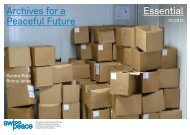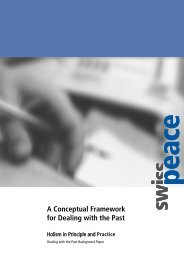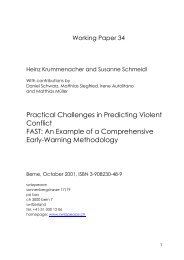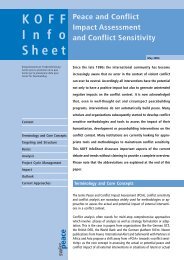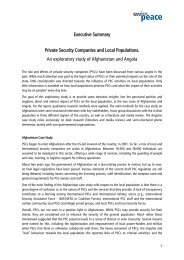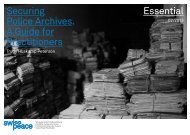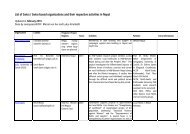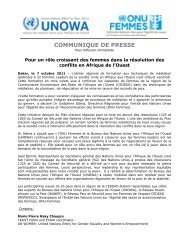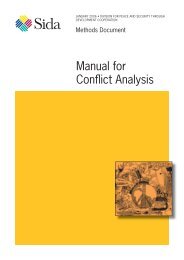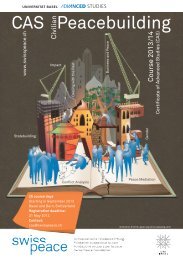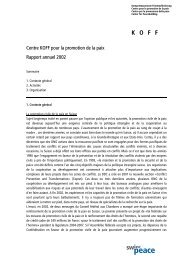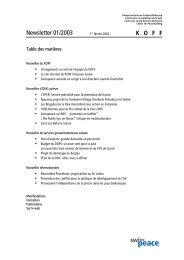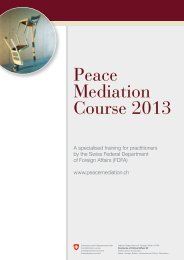Unpacking the Mystery of Mediation in African Peace ... - Swisspeace
Unpacking the Mystery of Mediation in African Peace ... - Swisspeace
Unpacking the Mystery of Mediation in African Peace ... - Swisspeace
You also want an ePaper? Increase the reach of your titles
YUMPU automatically turns print PDFs into web optimized ePapers that Google loves.
Sudan, North-South Comprehensive <strong>Peace</strong> Agreement<br />
Background <strong>of</strong> <strong>the</strong> Conflict<br />
In <strong>the</strong> second civil war between <strong>the</strong> North and<br />
South (1983–2005), more than 4 million people<br />
were displaced, 600,000 refugees left <strong>the</strong> country,<br />
and more than 2 million people lost <strong>the</strong>ir lives,<br />
ei<strong>the</strong>r directly through <strong>the</strong> fight<strong>in</strong>g, or <strong>in</strong>directly<br />
from o<strong>the</strong>r consequences <strong>of</strong> <strong>the</strong> war, such as fam<strong>in</strong>e<br />
and disease. A key root to <strong>the</strong> conflicts <strong>in</strong> <strong>the</strong><br />
Sudan was <strong>the</strong> segregation <strong>of</strong> <strong>the</strong> South from <strong>the</strong><br />
North already before <strong>in</strong>dependence <strong>in</strong> 1956. Tensions<br />
between <strong>the</strong> center and <strong>the</strong> periphery were a<br />
consequence <strong>of</strong> disparate socio-economic and political<br />
development between <strong>the</strong> North and Central<br />
Sudan on <strong>the</strong> one hand, and South Sudan<br />
and o<strong>the</strong>r regions (e.g., Beja <strong>in</strong> <strong>the</strong> East and Darfur<br />
<strong>in</strong> <strong>the</strong> West) on <strong>the</strong> o<strong>the</strong>r hand. The SPLM/A<br />
<strong>in</strong> <strong>the</strong> South and <strong>the</strong> GoS, dom<strong>in</strong>ated by<br />
NIF/NCP 198 <strong>in</strong> <strong>the</strong> North were <strong>the</strong> ma<strong>in</strong> parties<br />
<strong>in</strong>volved <strong>in</strong> <strong>the</strong> negotiations. The ma<strong>in</strong> issues<br />
evolved around <strong>the</strong> relationship between religion<br />
and state, wealth and power-shar<strong>in</strong>g, <strong>the</strong> three<br />
contested areas (Blue Nile Hills, Abyei, and Nuba<br />
mounta<strong>in</strong>s), and security issues.<br />
Previous Negotiations / Pre-<br />
Negotiations / Entry Po<strong>in</strong>ts<br />
There have been many steps towards peace between<br />
North and South Sudan. Between 1972<br />
and 2005, <strong>the</strong>re have been at least 25 formats for<br />
direct or third-party-facilitated talks between different<br />
parties <strong>in</strong>volved <strong>in</strong> <strong>the</strong> conflict, <strong>in</strong>clud<strong>in</strong>g<br />
mediation efforts by at least seven different mediators/mediation<br />
teams. 199<br />
IGAD-led Process until <strong>the</strong> Machakos<br />
Protocol<br />
The IGAD, a regional organization <strong>in</strong>terested <strong>in</strong><br />
<strong>the</strong> stability <strong>in</strong> <strong>the</strong> region, concerned about <strong>the</strong><br />
spread <strong>of</strong> political Islam and aim<strong>in</strong>g at <strong>the</strong> unity<br />
<strong>of</strong> Sudan, began a process <strong>in</strong> 1994 between <strong>the</strong><br />
SPLM/A, SPLM/A-United, and <strong>the</strong> GoS. The<br />
198 National Islamic Front (NIF); <strong>in</strong> 1998 and 2000 parts <strong>of</strong> <strong>the</strong><br />
NIF became <strong>the</strong> NCP.<br />
199 Mason, Simon: “Learn<strong>in</strong>g from <strong>the</strong> Swiss <strong>Mediation</strong> and Facilitation<br />
Experiences <strong>in</strong> Sudan”, Work<strong>in</strong>g Paper, <strong>Mediation</strong> Support<br />
Project (Center for Security Studies, Swiss Federal Institute<br />
<strong>of</strong> Technology/swisspeace) (2007), (http://www.swisspeace.ch/<br />
mediation).<br />
parties jo<strong>in</strong>ed <strong>the</strong> IGAD process <strong>in</strong> 1994 because<br />
<strong>the</strong>y feared sanctions and isolation from <strong>the</strong><br />
IGAD countries. The talks led to <strong>the</strong> Declaration<br />
<strong>of</strong> Pr<strong>in</strong>ciples (DoP) <strong>of</strong> 20 July 1994, on <strong>the</strong> right<br />
to self-determ<strong>in</strong>ation <strong>of</strong> South Sudan, <strong>the</strong> priority<br />
on ma<strong>in</strong>ta<strong>in</strong><strong>in</strong>g <strong>the</strong> unity <strong>of</strong> Sudan, and <strong>the</strong> relationship<br />
<strong>of</strong> state and religion. The DoP was a useful<br />
framework, yet it was not b<strong>in</strong>d<strong>in</strong>g, its implementation<br />
was unclear, and it was only accepted<br />
with reservations by <strong>the</strong> GoS <strong>in</strong> 1997. The talks<br />
between 1994 and 2002 can be viewed as a prenegotiation<br />
phase or as confidence-build<strong>in</strong>g talks,<br />
with both sides test<strong>in</strong>g <strong>the</strong> waters, f<strong>in</strong>d<strong>in</strong>g out<br />
how far each side could go, but also becom<strong>in</strong>g<br />
aware <strong>of</strong> <strong>the</strong> costs and difficulties <strong>in</strong>volved <strong>in</strong> serious<br />
negotiations. Essential to this phase was <strong>the</strong><br />
agreement on key pr<strong>in</strong>ciples that set <strong>the</strong> framework<br />
for <strong>the</strong> talks. The agreement on <strong>the</strong><br />
Machakos protocol <strong>in</strong> July 2002, clarify<strong>in</strong>g and<br />
consolidat<strong>in</strong>g <strong>the</strong> DoP was a milestone.<br />
Machakos ensured <strong>the</strong> South <strong>the</strong> right <strong>of</strong> selfdeterm<strong>in</strong>ation,<br />
and gave <strong>the</strong> North <strong>the</strong> right to<br />
<strong>in</strong>troduce sharia law. Both actors focused on <strong>the</strong><br />
unity <strong>of</strong> Sudan, but <strong>the</strong> possibility <strong>of</strong> secession<br />
was envisaged for <strong>the</strong> case <strong>of</strong> failed negotiations.<br />
Renewal <strong>of</strong> <strong>Peace</strong> Process as <strong>of</strong> 2002<br />
Besides <strong>the</strong> IGAD-led process, o<strong>the</strong>r events and<br />
processes also helped to br<strong>in</strong>g about <strong>the</strong> talks that<br />
f<strong>in</strong>ally led to <strong>the</strong> Comprehensive <strong>Peace</strong> Agreement<br />
<strong>in</strong> 2005. This <strong>in</strong>cluded <strong>the</strong> new geopolitical<br />
context after <strong>the</strong> attacks <strong>in</strong> New York and Wash<strong>in</strong>gton<br />
<strong>in</strong> 2001, <strong>in</strong>ternal political and military developments<br />
<strong>in</strong> Sudan, greater <strong>in</strong>ternational <strong>in</strong>volvement<br />
<strong>in</strong> <strong>the</strong> IGAD process, and a new proposal<br />
(Machakos protocol) drafted by a qualified<br />
mediation team, based on previous <strong>in</strong>itiatives. 200<br />
Sudan’s <strong>in</strong>ternational posture was directly affected<br />
by <strong>the</strong> attacks on <strong>the</strong> US <strong>in</strong> 2001. Due to<br />
Osama b<strong>in</strong> Laden’s l<strong>in</strong>ks to Sudan and <strong>the</strong> fundamentalist<br />
Muslim policies <strong>of</strong> <strong>the</strong> GoS, <strong>the</strong> US<br />
was strongly suspicious <strong>of</strong> Sudan. After <strong>the</strong> attacks<br />
on its territory, <strong>the</strong> US wanted to f<strong>in</strong>d out<br />
where <strong>the</strong> Sudanese government stood. To do<br />
this, <strong>the</strong> goodwill <strong>of</strong> <strong>the</strong> Sudanese was to be<br />
200 Rogier, Emeric: “Design<strong>in</strong>g an Integrated Strategy for <strong>Peace</strong>,<br />
Security and Development <strong>in</strong> Post-Agreement Sudan”, The<br />
Hague: Ne<strong>the</strong>rlands Institute <strong>of</strong> International Relations<br />
‘Cl<strong>in</strong>gendael’ Conflict Resolution Unit (2006), p. 45.<br />
73



